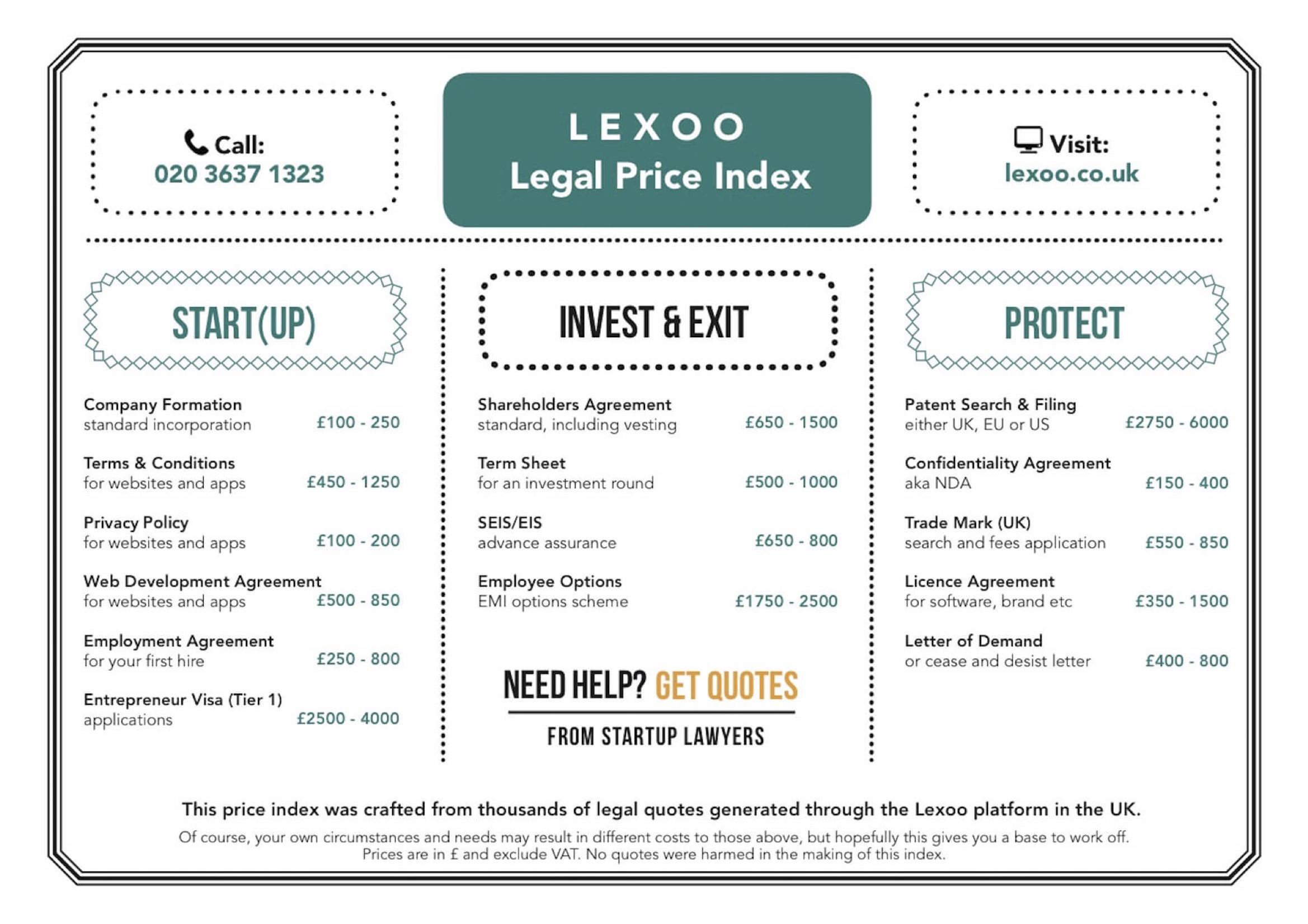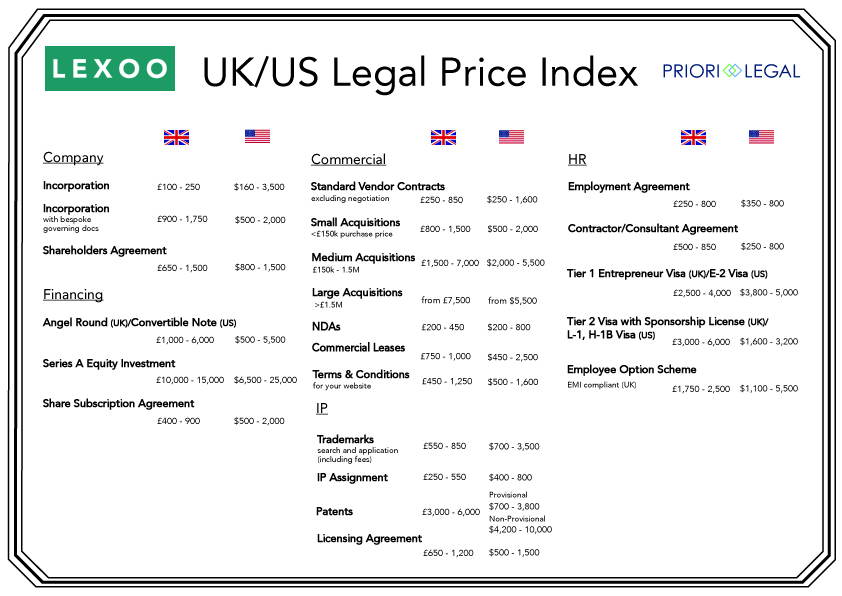The UK-USA Legal Price Index
Learn the average prices charged for legal services with the world’s first Legal Price Index, created by UK-based Lexoo and US-based Priori Legal. Lexoo and Priori Legal are the leading curated legal-technology platforms in the UK and US, respectively.
How much should you pay your lawyer?
The legal world is tricky to navigate for businesses and individuals alike. It’s alien to most of us, we only have to delve into it a finite number of times in our lives. How do you know a lawyer is right for the job? And how do you know that you’re being charged a fair price?
These are notoriously difficult issues. Historically, businesses and individuals alike would use the same law firm, without question, for their various legal needs. Without competition and with so much fragmentation in the market, there has tended to be a dearth of information on how much lawyers actually cost.
Recently, the UK Competition and Markets Authority found that few legal-services providers publish their prices online (read more here), and that there is also a lack of digital comparison tools, to the detriment of customers. Individuals and small businesses often get poor value when seeking legal advice, the report explains.
Lawyers get away with being vague on pricing, and many still charge clients by the hour. This can encourage inefficient use of time and ultimately the client ends up paying for this. Even when offering fixed price fees, lawyers can charge what they like because of the lack of competition and opacity in the market.
It can be extremely time consuming to find and vet multiple lawyers and get their quotes. Getting fixed prices via phone or email proves especially challenging, as each lawyer often requires answers to a unique list of questions before providing a cost.
Improving Accessibility to Legal Services
In economics, a perfect market is defined by perfect competition, a core component of which is perfect information. Without the proliferation of information, the market for legal services has traditionally been far from perfect.
Law is traditionally considered to be both a credence good and experience good. This means that clients do not have the requisite expertise to evaluate whether the lawyer actually did a good job as a matter of law and that the only way that clients can have a sense of whether they hired the right lawyer is after the work has been completed, based on a perception of some aspect of the service.
Professor Rebecca Sandefeur at Stanford Law School has explained that people looking for legal service providers “turn to people that they already know in order either to provide the services or to give advice about whom to choose as a provider.” Those people, however, will only have experienced a handful of specific lawyers for a few specific tasks and so won’t be able to objectively choose the best lawyer for a friend or colleague.
In the Internet age this no longer needs to be the case. Information on legal services can (and should) be available at people’s fingertips. Information on pricing, traditionally elusive in law because of the billable hour fee structure, is an integral element in allowing clients to make better choices.
Constructive Disruption
We are in a time when talk of ‘disruption’ in the delivery of legal services proliferates. Richard Susskind predicts that legal institutions and lawyers “are poised to change more radically over the next two decades than they have over the last two centuries.” Disruption in the legal services market should not, however, be considered synonymous with destruction. As the Legal Price Index shows, this disruption can be constructive.
Well-functioning markets are meant to provide choice to consumers but because clients have had no easy means to receive comprehensive information on how much different lawyers would charge for any given piece of legal work, the legal market was dysfunctional from a client’s perspective. The Internet has made it possible to change this.
For a wide range of other products and services, it is easy to now find information on prices and compare offers from different providers. Lexoo and Priori’s Legal Price Index is one of the first attempts to bring such clarity to at least one area of the legal services market. It makes legal services more accessible and less alienating, empowering clients to make better decisions when seeking legal help – it no longer has to be costly, time-consuming and intimidating.
The billable hour fee structure, for so long a dominant feature of legal pricing, will also come under pressure as a result of the proliferation of more clear information as to costs. The uncertainty and lack of clarity associated with that method of billing has long been criticised, but clients had few alternative options. As knowledge of normal total costs for certain work becomes widely known, it is likely that they those services will more commonly be offered at a shelf price.
Informed clients can make rational decisions about which lawyer to select for a particular job. It provides a bargaining chip to clients when seeking to instruct a lawyer. In providing this information, Lexoo and Priori not only assist these clients but help in the creation of a better-functioning market for legal services.
As disrupters to the traditional legal market, Lexoo and Priori provide platforms where lawyers can consult with and get multiple quotes from a hand-picked group of lawyers that are right for the particular task. The Legal Price Index serves as an example of an indirect benefit of this disruption - the platform enables the generation of information that helps to make legal services more accessible to lay people.
However, the direct benefits should not be overlooked - it enables the effective connection of well-matched clients and lawyers and takes much of the burden off of lawyer-client relationships.
Connecting Clients and Lawyers
In many other areas, the Internet has connected millions of people who would have not otherwise been connected. There is no reason why this has to be any different when it comes to lawyers and potential clients. Creating a network between clients and lawyers is of benefit for both. It creates a previously non-existent forum in which lawyers and clients can benefit each other.
Internet platforms that connect lawyers and clients show the transformational impact of technology on legal services and provide evidence on how technology in the legal domain does not necessarily threaten to replace lawyers. In this instance, it actually helps many lawyers to reach out to prospective clients and thus grow their businesses. It enables, rather than stifles, the activities of these lawyers.
In a similar fashion, combining a proliferation of information with easier means of connecting with lawyers enables clients to reach out to lawyers beyond their geographical location or their own network and connect with a lawyer who is truly appropriate for their specific needs at any given time. In bringing lawyers and clients together, platforms also provide smaller businesses with some of the advantages that larger business derive from in-house legal departments who often send requests for quotes out to large city firms before making a decision as to which lawyer to go with.
Information on its own would not help much if clients did not have a choice of different legal service providers. Clients no longer place all their eggs in one lawyer’s basket but are able to move from one lawyer to another for different tasks.
Presenting the Legal Price Index
As platforms that connect clients and lawyers, Lexoo and Priori Legal have dealt with thousands of legal enquiries, putting them in a unique position to gather useful information. Among other things, their work and collaboration have enabled the compilation of a Legal Price Index setting out the average prices one can expect to pay a lawyer for a particular piece of work in the UK and US. It should be noted, however, that this is a general overview of standard hourly pricing. More customized and sophisticated solutions do not lend themselves to a pricing index of this kind.
Having run a data analysis on over 15,000 quotes submitted through the Lexoo platform, Lexoo was able to create the below legal price index in 2015. This provides a bargaining chip to clients when seeking to instruct a UK lawyer. Of course, individual circumstances and needs may result in different costs to those in the index, but this provides a base guideline to fair legal pricing.

Likewise, Priori analyzed its database of thousands of fees submitted by its platform attorneys to arrive at the price ranges.
In 2016, Lexoo and Priori team up to create a Legal Price Index that reflects both the American and the English markets.

The Long-Term Impact
As more information beyond cost is gathered on legal services that enable comparisons to be drawn by customers, such as the quality of particular lawyers, the lawyer-client relationship will be thrust into the twenty-first century. Overall, then, the result of the spread of information such as that provided in the Legal Price Index will be an increasingly competitive market for legal services. Such a market is of benefit to both clients and good lawyers.
The future of law does not need to be focused on the replacement of lawyers, but rather how to enable lawyers to deliver a better service that meets the needs and expectations of twenty-first century clients. Innovative thinking can simultaneously open up legal services to clients and open up different markets to lawyers.
About Lexoo
After six years as an international lawyer in the London, Daniel van Binsbergen founded Lexoo to improve the legal experience for a broader population using technology. Lexoo helps businesses and in-house legal teams source transparent, fixed fee quotes from the UK’s most talented independent lawyers quickly and at significant discounts.
About Priori Legal
Priori Legal was founded by Basha Rubin and Mirra Levitt. As classmates at Yale Law School, Basha and Mirra became acutely aware of the structural barriers that prevented businesses and in-house departments from using legal counsel in the most effective way. Today, Priori uses technology to hand-match businesses and in-house legal departments to lawyers from a rigorously vetted network of attorneys at extremely competitive rates.
Need legal work done?
-
Post your job
Only the most suitable lawyers are invited to quote
-
Compare quotes
Get 3-4 tailored quotes within 2 business days
-
Choose your lawyer
Have a free, no obligation call with your chosen lawyer